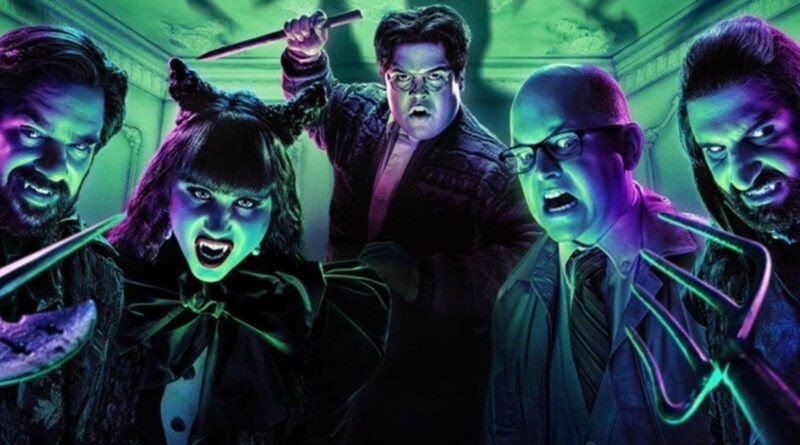How What We Do in The Shadows Paved the Way for Our Flag Means Death

There’s a moment in the new season four trailer for FX’s What We Do in The Shadows where the vampires’ neighbor asks, “What’s the word for what you guys are?” When Guillermo (Harvey Guillén) responds “Polyamorous?”, the neighbor says, “No, I was kind of thinking like dirty hippies.”
For stalwart viewers of What We Do In The Shadows (and even longtime fans of the franchise, which began in 2014 with the film of the same name), this kind of causal explanation of the house’s relationships is nothing that we don’t know. Throughout the past three season we have heard of all the various sexual exploits of our favorite undead housemates, and a large amount of their storylines tie into finding love.
The queerness is ingrained into the fabric of the show. In the very first episode of the first season, we learn that both Nadja (Natasia Demetriou) and Lazslo (Matt Berry)—a vampire married couple—have had affairs with Baron Afanas. As the show progresses we learn that Nadja has had multiple affairs with other men, most notably the tragic, eternally reincarnated Gregor, and it was confirmed in an interview with the Advocate that Nadja has had affairs with men and women. Elsewhere in season one, another vampire roommate, Nandor (Kayvan Novak), fails a citizenship test because he identifies George Washington as the first gay president (because they had an affair, obviously), and in season two, it’s revealed that Laszlo and Nandor have had some dalliances. In season three, Nandor explicitly states that he likes men and women. Guillermo is also implied to be asexual; the token human in the house, he’s also the only main character in the series who does not explicitly pursue romance and he says that he doesn’t kiss and tell because “I don’t kiss,” which can be interpreted through a queer, asexual lens.
While nobody has ever come out and said the words, “queer,” “gay,” “bisexual,” “pansexual,” or “asexual” on the show, What We Do in the Shadows has still managed to establish that it is queernormative and casually comedic, while never taking aim at the queer community. It proved that you can do a show about queer people without making queerness a punchline. As the vampires go through their immortal lives, they simply don’t think about their sexuality getting in the way. There are no coming out stories (these vampires are 800-300 years old, after all), queer trauma, or overt fights against political authorities who are trying to define or restrict their queerness. Even in 2019, when this show first aired, it felt like revolutionary television.
And now? We have HBO Max’s Our Flag Means Death, which takes the queernormativity that earned What We Do in the Shadows so many accolades and ramps it up to 11 by making a queer romance the entire hinge on which the show turns. As the pirates Edward “Blackbeard” Teach (Taika Waititi, who co-wrote and co-directed the Shadows movie, and is a producer and occasional director and co-star on the FX series) and Stede Bonnet (Rhys Darby, who also co-starred in the Shadows movie) fall in love, the whole show frames itself around their romance, and the people and expectations that stand in their way. Meanwhile there are nonbinary pirates, gay scribes, and polyamorous ladies all in play, done completely without any sense of malice or apathy. Much like the vampires of What We Do in the Shadows, these pirates are just trying to get by, thank you very much.
G/O Media may get a commission

It’s impossible to ignore the fact that there are overlapping players in the mix here. The same kind of offbeat, improvisational, Kiwi comedy permeates both television series, even though they are produced and were developed in the U.S. Just like in the vampire show, there are never any explicit labels applied to the pirates. They are simply allowed to exist in the messy ocean of queerness, without having to be put into a box that might create assumptions or limitations of their narratives.
It feels like a very easy statement to make; that these two shows that share similar creators, actors, producers, and names, are pushing forward a queernormative agenda, but it still feels important to say so. The audience for Our Flag Means Death was primed by the existence of What We Do in the Shadows, and both serve as groundbreaking works of representation on screen.
Sometimes, representation doesn’t have to be that deep. It can just exist in order to further expand the narratives that marginalized groups are often sidelined, forced, or stereotyped into. That’s the whole point here, that casual representation of any identity will always mean more than no representation at all, and will typically only serve to normalize that identity in storytelling. Creating empathetic characters with intense, meaningful backstories and wonderful plots who just happen to be queer is an incredibly important, underutilized tool in television. But luckily we have What We Do in the Shadows and Our Flag Means Death to help show others how it’s done.
Want more io9 news? Check out when to expect the latest Marvel and Star Wars releases, what’s next for the DC Universe on film and TV, and everything you need to know about House of the Dragon and Lord of the Rings: The Rings of Power.

